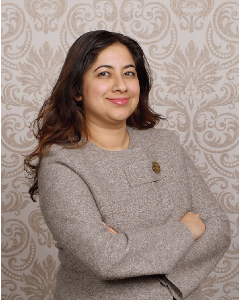 SUMBAL MAHMUD is a Human Services Judge in the Appeals Division. Prior to that she obtained top secret security clearance with the federal government, and was trained at a Federal Law Enforcement Training Center (FLETC) for 6 weeks for certification to become an asylum officer for the Department of Homeland Security. She has been the executive director of a large non-profit organization in Chicago and in-house counsel for Best Buy.
SUMBAL MAHMUD is a Human Services Judge in the Appeals Division. Prior to that she obtained top secret security clearance with the federal government, and was trained at a Federal Law Enforcement Training Center (FLETC) for 6 weeks for certification to become an asylum officer for the Department of Homeland Security. She has been the executive director of a large non-profit organization in Chicago and in-house counsel for Best Buy.
Why did you go to law school?
When I was young, I thought lawyers went around and saved the world or something. I had a passion for and happened to excel in speech, debate, and mock trial. One of my most treasured mementoes from high school is an award I received from the MSBA Mock Trial program. I owe immense gratitude to the MSBA and to each and every lawyer who volunteered as a mock trial judge. If you are one of my former coaches, or ever gave up a Saturday to help me perfect my courtroom skills, I would love to reconnect with you and thank you in person. I cannot repay you, but know that I am trying to pay your investment forward. It took 20 years, but I am now fortunate enough to sit on the MSBA Council—the board of directors of the organization that played a part in setting me on my way to a legal career.
Tell us a little about the humanitarian work you do.
I was born in Lahore, Pakistan. My family immigrated to Minnesota when I was 18 months old. I have lived a life trying to navigate two cultures, two countries, two identities (an American in Pakistan, a Pakistani-American in America). It has taken some time, and I have made some awkward mistakes, but I think I have finally settled on being comfortable in my own in-between.
Even while developing my legal career, my heart has, all the while, kept being drawn back to the street children in Pakistan. When I see my friends’ social media postings of their kids on the first day of school, I immediately think of what many school-age children in Pakistan would do for the chance to go to school. My business plan is micro-lending for education. My hope is that instead of buying your family member yet another trinket for a holiday, people might be moved to lend a family enough money to educate their child. Micro-lending has an incredible return on investment and loans are repaid or paid forward at a high rate.
I am a frequent public speaker. I have given thousands of speeches, participated on panels, and been the keynote speaker for many events, but to leave a true legacy, my desire is to write a children’s book here in the U.S. and use the proceeds to fund children to attend school elsewhere in the world. I have not made this happen yet, but I believe in the power of affirmations, so if the universe is reading this—please help me!
You’ve volunteered extensively with bar groups—serving on ABA committees, serving for five years on the national board of directors of NAPABA, rising to president of the Minnesota chapter of NAPABA—and you recently joined the MSBA Council. What do you get from your work with the MSBA and other bar groups?
Friends? Only kidding a little bit. Whether it be on LinkedIn or Facebook, my bar group friends are always the most supportive and encouraging of all my endeavors. For example, I posted that I would like to purchase water filters for the poor in Pakistan. Each filter cost $60 and would last about a year. It would save a family (usually the women/girls of the home) four hours of their day in pursuit of clean water. In a matter of hours, friends donated generously toward this cause.
As a lawyer, you’ve worked in many settings: as a private practitioner, corporate counsel, asylum officer for the Department of Homeland Security, and as a Human Services judge. Which has been most memorable, or most meaningful, to you?
All of the above. Each experience has prepared me for the next. Whether conducting interviews of asylum seekers near the U.S./Mexico border, adjudicating affirmative asylum applications, or conducting hearings at DHS, my job at the end of the day is to listen (and to write). I used to think that being a lawyer was all about speaking, but I have come around to believe that it is more about listening. Lawyers are listeners who capture and tell someone else’s story.